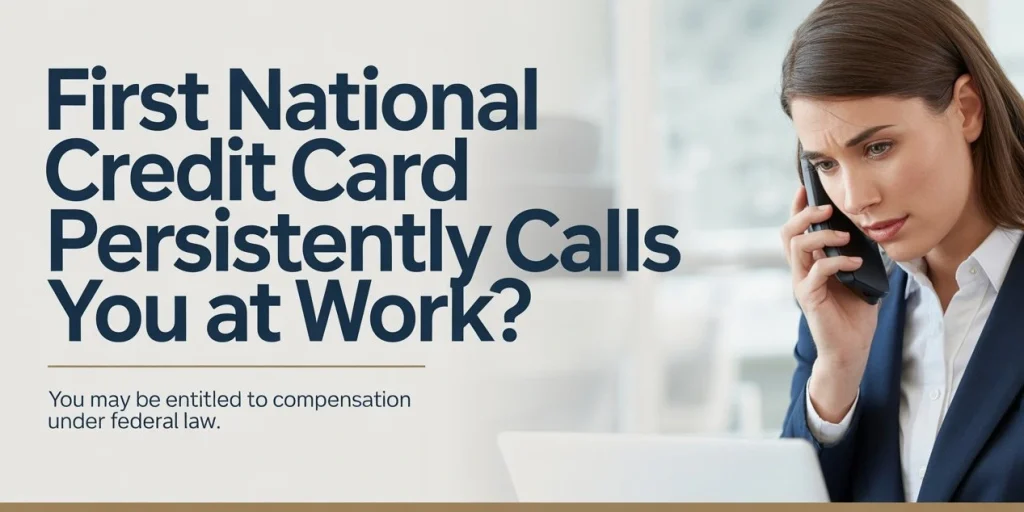First National Credit Card Phone Harassment?
Do you receive automated calls from First National Credit Card? Does First National Credit Card use robocalls to call you over and over again harassing you all day long? Receiving calls from debt collectors can be overwhelming and cause significant stress, especially when they happen repeatedly. No company has the right to harass you. Stop First National Credit Card Phone Harassment and take your life back.
Take steps to get First National Credit Card to stop calling and reduce the stress of constant phone harassment. Call us right away. Knowing when and how to respond to debt collection calls can help protect your rights and improve your situation. Above all you don’t have to live in fear of your phone.
Who Is Behind First National Credit Card?
| Detail | Information |
|---|---|
| Credit Card Name | First National Credit Card |
| Issuing Bank | First National Bank of Omaha (FNBO) |
| Entity Type | Original creditor (national bank) |
| Headquarters | Omaha, Nebraska |
| Role | Issues and services First National Credit Card accounts |
| FDCPA Status | Generally not covered when collecting its own debts |
| TCPA Status | Covered (calling and robocall restrictions apply) |
First National Credit Card is issued and serviced by First National Bank of Omaha (FNBO), a federally regulated national bank. Because FNBO is the original creditor, it is treated differently under consumer protection laws than third-party debt collection agencies.
This distinction plays a major role in determining which laws apply to phone calls and collection activity.
First National Credit Card Phone Numbers
| 888-883-9824 |
| 866-205-6600 |
This list is not exhaustive. Calls may come from rotating or different numbers and still originate from the same creditor or its agents. Keep a call log noting the date, time, number, and nature of each call.

Why the Bank Relationship Matters
Since First National Bank of Omaha is the original creditor:
- The FDCPA usually does not apply when the bank is collecting its own accounts
- The TCPA does apply, even to banks and creditors
- State consumer protection laws may also limit excessive or abusive calling behavior
Understanding this upfront prevents confusion about your legal options.
Common First National Credit Card Calling Complaints
Consumers commonly report:
- Repeated calls throughout the day
- Automated or prerecorded messages
- Calls made early in the morning or late at night
- Difficulty getting clear identification from the caller
- Continued calls even after requesting that communication stop
Not every call is illegal, but patterns of excessive or automated contact may raise legal concerns.
Laws That Limit First National Credit Card Phone Calls
| Law | Applies to First National Credit Card? | What It Limits |
|---|---|---|
| Telephone Consumer Protection Act (TCPA) | Yes | Use of auto-dialers, prerecorded or artificial voice calls, call frequency, opt-out rights |
| Fair Debt Collection Practices Act (FDCPA) | Generally No | Does not usually apply to original creditors like FNBO |
| State Consumer Protection Laws | Often Yes | Excessive, abusive, or harassing call behavior by creditors |
| Truth in Lending Act (TILA) | Limited | Disclosure and billing practices (not call frequency) |
When Calls May Cross the Legal Line
Calls may become problematic if:
- You receive multiple calls per day over a sustained period
- Robocalls or prerecorded messages are used without consent
- Calls continue after you request they stop
- The caller refuses to clearly identify the company
- Threats are made that the caller cannot legally carry out
The overall pattern of behavior matters more than a single call.
What You Can Do If Calls Continue
- Document every call, voicemail, or message
- Confirm who is calling — the bank or a third party
- Request limited or written communication
- Review your state’s consumer protection laws
- Speak with a consumer rights attorney if the calls do not stop
Are There Lawsuits Against First National Credit Card?
At this time, there are no publicly reported court judgments specifically alleging phone harassment or robocall violations against First National Credit Card or First National Bank of Omaha.
Most publicly available cases involving the bank relate to banking, credit reporting, or contractual matters rather than phone harassment claims.
The absence of reported lawsuits does not automatically mean calling practices are lawful. Legal violations depend on call frequency, consent, technology used, and applicable state law.
Conclusion
First National Credit Card is issued by First National Bank of Omaha, an original creditor. While some debt collection laws do not directly apply to banks, federal calling restrictions and state consumer protection laws still limit how and when calls may be made.
If calls feel excessive, automated, or difficult to stop, understanding the bank relationship and applicable laws puts you in a stronger position to protect your rights and regain peace of mind.
CONSUMER RIGHTS LAW FIRM PLLC
Consumer Rights Law Firm PLLC is a law firm that specializes in helping clients who are facing harassment from debt collectors in any form, including telephone communication. Rather than suffer alone, contact a legal professional to stop the First National Credit Card phone harassment. You can also write to us or send mail to discuss your situation and get help.
If you are interested in learning more about how to safeguard yourself and prevent even more First National Credit Card Phone Harassment, call us at (877)700-5790 for immediate assistance or visit our website. You may also consider reaching out to credit counselors for advice on managing your debt and understanding your rights.

Success Stories
1. ⭐⭐⭐⭐⭐ – Outstanding Legal Support!
I contacted CRLF when I was overwhelmed by constant debt collection calls. Their team was extremely professional and reassuring. They explained my rights clearly and took immediate action. Within days, the harassing calls stopped! I highly recommend CRLF if you’re dealing with unfair debt collection practices.
2. ⭐⭐⭐⭐⭐ – Fast, Effective, and Compassionate
CRLF handled my case quickly and with care. I was being harassed by a collection agency that wouldn’t stop calling. The attorneys at CRLF not only stopped the harassment but also helped me understand my legal options. I never felt judged—only supported.
3. ⭐⭐⭐⭐ – Great Service but Slight Delay
The overall experience with CRLF was very positive. The legal team is knowledgeable and helpful. There was a slight delay in getting updates, but once my case moved forward, they got results. The calls from collectors stopped, and I finally feel at peace. Thank you, CRLF!
4. ⭐⭐⭐⭐⭐ – Life-Changing Help
CRLF changed my life. I didn’t even know I had rights against aggressive debt collectors. They stepped in and turned a stressful situation into something manageable. I even received compensation for the harassment I endured. I’m beyond grateful.
FAQs
What counts as harassment by First National Credit Card collectors?
Harassment includes repeated calls intended to annoy, abuse, or pressure you. This can involve calling outside the permitted hours of 8 a.m. to 9 p.m., using threatening or profane language, continuing to call your workplace after being told not to, or sharing details of your debt with third parties. These actions are restricted under federal debt collection laws.
Can First National Credit Card collectors call my workplace?
No. Once you inform them that calls to your workplace are not allowed, they must stop. Continuing to contact you at work after receiving this notice may be considered a legal violation.
How many times can First National Credit Card collectors legally call me?
The law does not specify an exact number of calls. However, collectors are prohibited from calling repeatedly with the intent to harass. Calling multiple times per day or persistently over a short period may be viewed as excessive and unlawful.
What should I do if First National Credit Card collectors keep calling me?
Start by keeping a record of every call, including the date, time, and what was said. You can then send a written cease-and-desist letter requesting that the calls stop. If the calls continue, you may consider filing a formal complaint with the appropriate authorities.
Can I record calls from First National Credit Card collectors?
Recording laws vary by state. Some states require consent from all parties on the call, while others allow one-party consent. Before recording any calls, check your local laws. Regardless, maintaining written call logs is always recommended.
Does First National Credit Card have to validate the debt before calling?
They are required to provide a debt validation notice within five days of their initial contact. This notice must include the amount owed, the name of the creditor, and information on how you can dispute the debt if you believe it is incorrect.
Can I sue First National Credit Card for phone harassment?
Yes. If collectors violate debt collection laws by making harassing calls, calling at improper times, or ignoring written requests to stop, you may be able to file a lawsuit. Claims generally must be filed within one year, and compensation may include statutory damages, actual losses, and attorney fees.
Can First National Credit Card affect my credit score if they call me?
Phone calls themselves do not impact your credit score. However, the calls usually indicate a past-due account. If the debt is reported to credit bureaus, it may negatively affect your credit history and score.
Can I stop First National Credit Card from calling by sending a letter?
Yes. Sending a written cease-and-desist letter requires collectors to stop contacting you. After receiving the letter, they may only contact you to confirm that communication will stop or to notify you of specific legal actions.
How do I report First National Credit Card for phone harassment?
You can submit complaints to the (CFPB), the Federal Trade Commission (FTC), and your state attorney general’s office. Supporting documents such as call logs, voicemails, and copies of written correspondence can strengthen your complaint.







